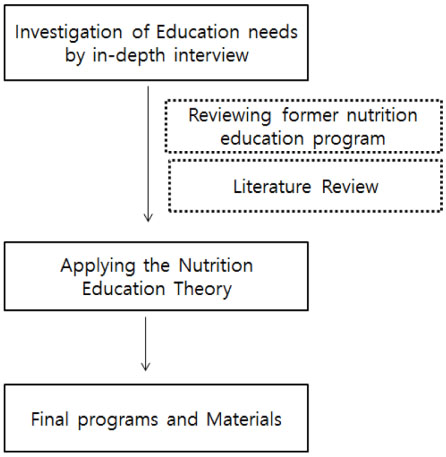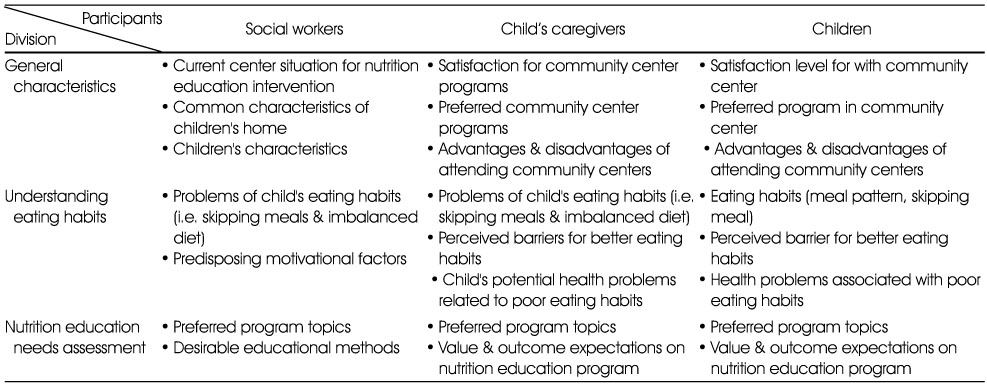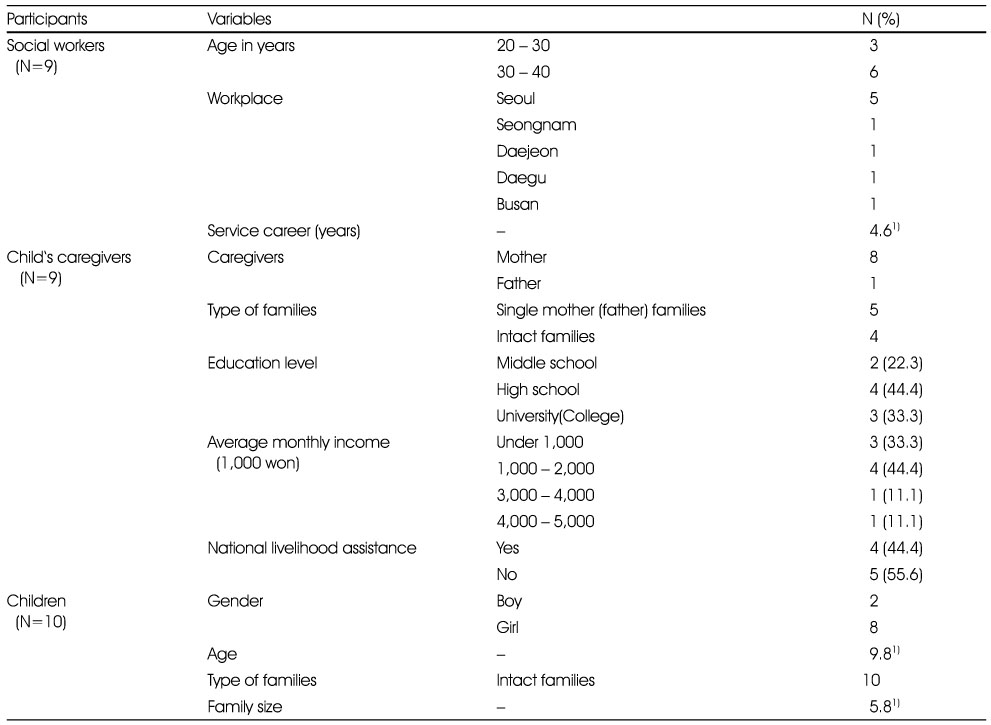Articles
- Page Path
- HOME > Korean J Community Nutr > Volume 20(3); 2015 > Article
-
Research Article
- The Development of a Nutrition Education Program for Low-income Family Children by applying the Social Cognitive Theory and Health Belief Model
- Saes-byoul Lee, Yu-Ri Jeong, Hyo-Jin Ahn, Min-Ji Ahn, Su-A Ryu, Nam-E Kang, Se-Young Oh
-
Korean Journal of Community Nutrition 2015;20(3):165-177.
DOI: https://doi.org/10.5720/kjcn.2015.20.3.165
Published online: June 30, 2015
1Department of Food and Nutrition, Kyung Hee University, Seoul, Korea.
2Department of Food and Nutrition, Eulji University, Songnam, Korea.
- Corresponding author: Se-Young Oh. Department of Food and Nutrition, Kyung Hee University, 26, Kyungheedae-ro, Dongdaemun-gu, Seoul 130-701, Korea. Tel: (02) 961-0602, Fax: (02) 959-0649, seyoung@khu.ac.kr
• Received: June 1, 2015 • Revised: June 19, 2015 • Accepted: June 27, 2015
Copyright © 2015 The Korean Society of Community Nutrition
This is an Open-Access article distributed under the terms of the Creative Commons Attribution Non-Commercial License (http://creativecommons.org/licenses/by-nc/3.0/) which permits unrestricted non-commercial use, distribution, and reproduction in any medium, provided the original work is properly cited.
- 1,378 Views
- 10 Download
- 7 Crossref
Abstract
-
Objectives
- Based on individual and environmental characteristics of low-income children, we developed a nutrition education program for school-aged children from low-income families according to effective use in social welfare centers.
-
Methods
- We conducted in-depth group interviews to assess program needs in 28 participants, 10 low-income school-aged children and 9 of their care givers, 9 social workers and 9 care-givers. Theoretical backgrounds of our program were heath belief model and social cognitive theory considering motivation, action and environment characteristics.
-
Results
- Based on the findings of this qualitative study, we developed major program themes and contents. Five selected key themes were 'balanced diet', 'processed food', 'food hygiene and safety', 'Korean healthy traditional diet', and 'family cooking' to induce changes in dietary behaviors. Main findings of in-depth group interviews included 'child's active participation', 'simple and easy to understand messages', and 'environmental constraints' such as a lack of child care at home, limited budget of social welfare centers, and less qualified educators for nutrition and health. Each lesson was constructed as a 1-hour program particularly emphasizing activity-based programs, including cooking and teamwork exercises. Program contents in each session consisted of activities that could induce outcome and value expectations, self-efficacy, perceived benefits, and barriers and cues to actions regarding diet behavior.
-
Conclusions
- We developed a nutrition education programthat is rarely available for low-income children in Korea, considering theoretical bases. Further studies are needed to validate our program.
Acknowledgments
Acknowledgments
Supplements
- 1. Kim HR, Lee SH, Choi JM, Oh YI. Children's obesity and underweight among low income families in Korea: status, implications and policy options [Internet]. Korea Institute for Health and Social Affairs; 2011; cited 2015 May 3]. Available from: https://www.kihasa.re.kr/.
- 2. Headquarters for Community Child Center. National community children welfare center status survey [Internet]. 2014; cited 2015 May 3]. Available from: http://www.icareinfo.info/.
- 3. Korea Association of Social Welfare Centers. Projected population [Internet]. 2014; cited 2014 May 10]. Available from: http://www.kaswc.or.kr/.
- 4. Jung KA. The review of the researches on the nutritional education state in the elementary school. J Korean Pract Arts Educ 2013; 19(1): 117-145.Article
- 5. Kim HK, Yun CH, Lee EH, Lee KI, Moon CS, Lee YH, et al. Development of health promotion program for low income children in underserved area. Korean Association of Health Promotion; 2007 Mar.
- 6. Kim HS. A user satisfaction and needs survey a child education program of social service center [master's thesis]. Sookmyung Women's University; 2012.
- 7. Hyon SM, Kim JW. Improvement of dietary attitudes of elementary students by nutrition labeling education. Korean J Community Nutr 2007; 12(2): 168-177.
- 8. Han HM, Lee SS. A nutrition education program development and the application for the elementary students - focused on sugar intake education -. J Korean Pract Arts Educ 2008; 21(2): 111-131.
- 9. Suh Y, Chung YJ. The effect of nutrition education on the improvement of psychosocial factors related to vegetable and fruit intake of elementary school children in pre-action stages. Korean J Nutr 2010; 43(6): 597-606.Article
- 10. Kim YS, Lee MJ. Effects of nutrition education through social cognitive theory in elementary school students - focusing on the nutrition education of sugar intake -. Korean J Food Nutr 2011; 24(2): 246-257.Article
- 11. Kim HH, Park YH, Shin EK, Shin KH, Bae IS, Lee YK. Students' and parents' perceptions of nutrition education in elementary schools. J Korean Soc Food Sci Nutr 2006; 35(8): 1016-1024.Article
- 12. Kim MS, Bae HO. Child poverty in Korea: Its magnitude and causes. Health Soc Welf Rev 2007; 27(1): 3-26.
- 13. Lim ES, Cho YS, Kim SN, Kim SB. Development and effects' analysis of nutrition education pamphlet for the higher grades elementary students - Focused on individual daily needed food exchange units -. Korean J Community Nutr 2012; 17(6): 689-706.Article
- 14. Ahn SH, Kim HK, Kim KM, Yoon JS, Kwon JS. Development of nutrition education program for consumers to reduce sodium intake applying the social cognitive theory - Based on focus group interviews -. Korean J Community Nutr 2014; 19(4): 342-360.Article
- 15. Lee IS, Shin EK. A study on the conceptualization of disability identity. Korean J Health Psychol 2005; 10(4): 509-530.
- 16. Choi EH, Son YB, Kim HJ. A study on the experiences of children using community children center. J Korean Counc Child Rights 2008; 12(2): 135-159.
- 17. Kim JH, Kim YS, Kim Y, Kang MS. Fruit and vegetable consumption and factors affecting fruit and vegetable consumption of school children and adolescents : Findings from focus - group interviews with school nutrition teachers and nutritionists -. Korean J Community Living Sci 2013; 24(4): 567-581.Article
- 18. Nam KH, Kim YM, Lee GE, Lee YN, Joung HJ. Physical development and dietary behaviors of children in low-income families of seoul area. Korean J Community Nutr 2006; 11(2): 172-179.
- 19. Jang HB, Park JY, Lee HJ, Kang JH, Park KH, Song JH. Association between parental socioeconomic level, overweight, and eating habits with diet quality in Korean sixth grade school children. Korean J Nutr 2011; 44(5): 416-427.Article
- 20. Park S, Song SM, Lee YH. The influence of self-esteem and self-efficacy on the academic achievement of elementary school children in poverty and comparative groups. Korean J Community Living Sci 2011; 22(3): 407-416.Article
- 21. Jung KA. The review of the researches on the nutritional education state in the elementary school. J Korean Pract Arts Educ 2013; 19(1): 117-145.Article
- 22. Park EY, Han SN, Kim HK. Assessment of meal quality and dietary behaviors of children in low-income families by diet records and interviews. Korean J Food Nutr 2011; 24(2): 145-152.Article
- 23. Lim SA. Investigating low-and high-income group differences in the academic achievement: longitudinal effects of cognitive readiness and parent's expectation and involvement. J Child Educ 2012; 21(4): 319-335.
- 24. Lee YJ, Bae JH. A study on the necessity for hygiene education for children at the Gyeongbuk community children center. Korean J Food Nutr 2011; 24(4): 577-588.Article
- 25. Her ES. Development of dietary life education textbook and teaching for creative activities in elementary school. Korean J Community Nutr 2013; 18(3): 203-212.Article
REFERENCES
Figure & Data
REFERENCES
Citations
Citations to this article as recorded by 

- Effects of Multidisciplinary Health Promotion Program Among Children in Community Childcare Center
Yerin Kim, Gyeong Seob Shin, Jungwon Park, Minji Kang, Kumhee Son, Yoon Myung Kim, Kyung Hee Park, Hyunjung Lim
Clinical Nutrition Research.2024; 13(1): 8. CrossRef - Developing educational programs to increase awareness of food additives among elementary school students
Soo Rin Ahn, Jae Wook Shin, Jung-Sug Lee, Hyo-Jeong Hwang
Journal of Nutrition and Health.2024; 57(4): 451. CrossRef - A Qualitative Study of the Awareness and Influencing Factors of the Dietary Habits of the Male and Female Workers' at a Manufacturing Facility in Gwangju
Ji Suk Yim, Young-Ran Heo
Korean Journal of Community Nutrition.2022; 27(1): 12. CrossRef - Evaluation of the Need for Obesity Prevention Education Programs through Analysis of Factors Affecting Student Obesity Factors in Seoul during the COVID-19 Pandemic
Seoung Hi Kim, Seonyeong Baek, Min Jeong Choi, Sunny Ham
Journal of the East Asian Society of Dietary Life.2022; 32(3): 214. CrossRef - Evaluation of a Nutrition Education Program Designed to Reduce Sugar Intake in Preschool Children
Ma-Young Yeom, Youn-Ok Cho
Journal of the Korean Dietetic Association.2016; 22(3): 179. CrossRef - Status of Dietary Life Related Knowledge, Self-Efficacy, Food Preference and Dietary Behavior of Preschoolers in Kyunggi Area
A Reum Lee, Ye Lee Yu, Hye Jin Kim, Kyung A Kim, Kyung Won Kim
Korean Journal of Community Nutrition.2016; 21(3): 274. CrossRef - Perception on Optimal Diet, Diet Problems and Factors Related to Optimal Diet Among Young Adult Women Using Focus Group Interviews: Based on Social Cognitive Theory
Hye Jin Kim, A Reum Lee, Kyung Won Kim
Korean Journal of Community Nutrition.2016; 21(4): 332. CrossRef
The Development of a Nutrition Education Program for Low-income Family Children by applying the Social Cognitive Theory and Health Belief Model


Fig. 1
Process of development of nutrition education program
Fig. 2
Development of program based on social cognitive theory and health belief model.
Fig. 1
Fig. 2
Warning: simplexml_load_file(): /home/virtual/kjcn/journal/../xmls/kjcn-20-165.xml:823: namespace error : Namespace prefix xlink for href on media is not defined in /home/virtual/kjcn/journal/journal/include.viewer.php on line 76
Warning: simplexml_load_file(): edia mimetype="application" mime-subtype="pdf" xlink:href="kjcn-20-165-s001.pdf" in /home/virtual/kjcn/journal/journal/include.viewer.php on line 76
Warning: simplexml_load_file(): ^ in /home/virtual/kjcn/journal/journal/include.viewer.php on line 76
The Development of a Nutrition Education Program for Low-income Family Children by applying the Social Cognitive Theory and Health Belief Model
In-depth interview questions
General characteristics of the study participants
1) Mean
Main issues for nutrition education program
Contents of nutrition education program considering theoretical bases
1) Social Cognitive Theory
2) Knowledge
3) Behavior
4) Health Belief Model
Table 1
In-depth interview questions
Table 2
General characteristics of the study participants
1) Mean
Table 3
Main issues for nutrition education program
Table 4
Contents of nutrition education program considering theoretical bases
1) Social Cognitive Theory 2) Knowledge 3) Behavior 4) Health Belief Model

 KSCN
KSCN






 Cite
Cite


